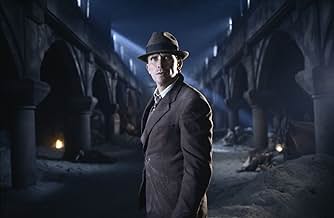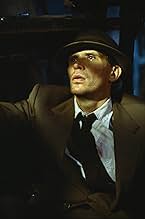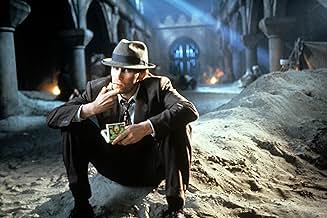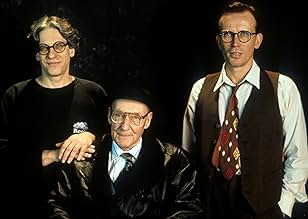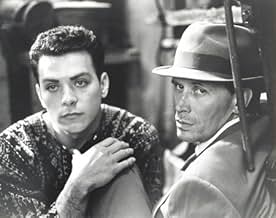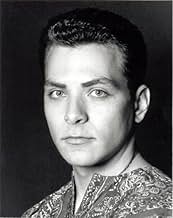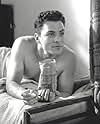After developing an addiction to the substance he uses to kill bugs, an exterminator accidentally kills his wife and becomes involved in a secret government plot being orchestrated by giant ... Read allAfter developing an addiction to the substance he uses to kill bugs, an exterminator accidentally kills his wife and becomes involved in a secret government plot being orchestrated by giant bugs in a port town in North Africa.After developing an addiction to the substance he uses to kill bugs, an exterminator accidentally kills his wife and becomes involved in a secret government plot being orchestrated by giant bugs in a port town in North Africa.
- Director
- Writers
- Stars
- Awards
- 13 wins & 17 nominations total
Joseph Scoren
- Kiki
- (as Joseph Scorsiani)
Louis Ferreira
- Exterminator #3
- (as Justin Louis)
- Director
- Writers
- All cast & crew
- Production, box office & more at IMDbPro
Featured reviews
God, I like Cronenberg. I like his commitment. I like his designs. I like the fact that he deals straight and heavy.
I even like the feel of this movie while at the same time noting that it fails, at least it fails if you consider the value of the book.
The book is one of many that deals with the sliding overlap between one reality and another. I welcome any of these. And this is particularly attractive because of the animate typewriters-become-agent-controllers. These are much more visceral in the film. But the book made much of the scintillating overlap, the typed page that touched the earth from time to time that we would literally hold in our hands to assure us that there was a reality.
Cronenberg has none of this. As with all his films, there is one world, and he invests heavily in making it real. So we see ourselves, the typewriter that takes control, that provides the trance, the words, the enticement toward perversion of several types and its means. Cronenberg's slip into alternative universes is slippery only one way; he won't let us come home. I admire this, because I would rather see passion invested by an artist than compromise for something as trivial as effect. But here, I do miss the effect.
Judy Davis is her usual sublime self. The character (actually two, sortof) is a mess and is never anchored. But she herself is, outside the film. Her character's role is crucial to the thing, a sort of fulcrum around which the real and hallucinogenic revolve. Sex, meaning, holding onto the world. She accomplishes this not through the character, but the solid soul of the actress which shines through. Who else can do this? No one I know.
Ted's Evaluation -- 3 of 3: Worth watching.
I even like the feel of this movie while at the same time noting that it fails, at least it fails if you consider the value of the book.
The book is one of many that deals with the sliding overlap between one reality and another. I welcome any of these. And this is particularly attractive because of the animate typewriters-become-agent-controllers. These are much more visceral in the film. But the book made much of the scintillating overlap, the typed page that touched the earth from time to time that we would literally hold in our hands to assure us that there was a reality.
Cronenberg has none of this. As with all his films, there is one world, and he invests heavily in making it real. So we see ourselves, the typewriter that takes control, that provides the trance, the words, the enticement toward perversion of several types and its means. Cronenberg's slip into alternative universes is slippery only one way; he won't let us come home. I admire this, because I would rather see passion invested by an artist than compromise for something as trivial as effect. But here, I do miss the effect.
Judy Davis is her usual sublime self. The character (actually two, sortof) is a mess and is never anchored. But she herself is, outside the film. Her character's role is crucial to the thing, a sort of fulcrum around which the real and hallucinogenic revolve. Sex, meaning, holding onto the world. She accomplishes this not through the character, but the solid soul of the actress which shines through. Who else can do this? No one I know.
Ted's Evaluation -- 3 of 3: Worth watching.
New York 1953. Bill Lee is a bug exterminator who follows his wife down the road of using the bug powder as a hallucinatory drug. When he is picked up by the police for suspected drug use he is left in the cell with a large bug that tells him that he is on a mission and must watch his wife. When he accidentally kills his wife he flees to Interzone to prepare his report, increasingly losing his grip on what is real and what is not.
I have seen this movie several times and am always taken in by it. In terms of narrative it is not the strongest film you'll ever see. In all honesty the plot is pretty thin and the film is best seen as a journey into destruction with Lee's drug addled writer slowly but surely losing grip on reality with every passing moment. The journey is reasonably interesting, even if it doesn't have enough pace to really be fascinating. What does hold the attention is the imagination of the film and it's ability to put onscreen a decent representation of Lee's hallucinations.
The effects are very good but it is their use that is better. While it does have a certain amount of gore, the creatures and hallucinations are actual characters (creepy characters at that) that are used well within the story, rather than just being effects or gore. The cast can't all say that and some of them are distinctly average at times. Weller is as good as ever in a dead eyed performance that gives way to madness and fear at times. Davis is every bit as good, delivering two roles and be riveting in both. Holm is OK and it's not his fault that I couldn't get Bilbo out of my mind! Sands and Schneider don't have enough to do but are interesting faces.
Cronenberg is the perfect choice for director, but it is good that he holds back from the full on gore or body horror, call it what you will. He uses a measured camera to film the hallucinations rather than using swinging `crazy' angles to portray mental state - that is a lazy technique. Here Cronenberg (and Weller's blank face) calmly and methodically fall into despair and it is good to watch.
Overall, this is not a perfect film - it is slow and the narrative doesn't totally grip, however it manages to make a good fist out of filming a descent into a hallucinatory nightmare. Worth seeing it once, but I can't imagine that the word `enjoyable' would really ever apply to this film.
I have seen this movie several times and am always taken in by it. In terms of narrative it is not the strongest film you'll ever see. In all honesty the plot is pretty thin and the film is best seen as a journey into destruction with Lee's drug addled writer slowly but surely losing grip on reality with every passing moment. The journey is reasonably interesting, even if it doesn't have enough pace to really be fascinating. What does hold the attention is the imagination of the film and it's ability to put onscreen a decent representation of Lee's hallucinations.
The effects are very good but it is their use that is better. While it does have a certain amount of gore, the creatures and hallucinations are actual characters (creepy characters at that) that are used well within the story, rather than just being effects or gore. The cast can't all say that and some of them are distinctly average at times. Weller is as good as ever in a dead eyed performance that gives way to madness and fear at times. Davis is every bit as good, delivering two roles and be riveting in both. Holm is OK and it's not his fault that I couldn't get Bilbo out of my mind! Sands and Schneider don't have enough to do but are interesting faces.
Cronenberg is the perfect choice for director, but it is good that he holds back from the full on gore or body horror, call it what you will. He uses a measured camera to film the hallucinations rather than using swinging `crazy' angles to portray mental state - that is a lazy technique. Here Cronenberg (and Weller's blank face) calmly and methodically fall into despair and it is good to watch.
Overall, this is not a perfect film - it is slow and the narrative doesn't totally grip, however it manages to make a good fist out of filming a descent into a hallucinatory nightmare. Worth seeing it once, but I can't imagine that the word `enjoyable' would really ever apply to this film.
Lots of people will hate this film, and some will love it.
The bottom line is, if you enjoy, respect, or feel that you understand the work of William S. Burroughs, you should see this film. If you don't know what I am talking about, you should probably not see this film.
The following pedantic and potentially inflammatory review, like this film, pulls no punches and makes no apologies for itself. Read on if you dare.
_________
If any three of the following conditions apply see Naked Lunch:
YOU
1. ...know what the term "visual metaphor" means.
2. ...are a Burroughs, Kerouac or Ginsburg fan.
2a. ...are not a fan, but know and respect Burroughs, Kerouac or Ginsburg
3. ...can't see how the book Naked Lunch could make a good film.
4. ... believe that Peter Weller is an underrated actor.
5. ...thought any of the following films were 'lightweight': Lost Highway, Mulholland Drive, Twin Peaks: Fire Walk With Me, The Last Wave, Heavenly Creatures, Dead Ringers.
6. ...have lived in the New York area for 15 or more years.
7. ...know the relationship between improvisational jazz, poetry, and modern art.
8. ...think you understand what Andy Warhol was trying to do.
9. ... are curious about what the process of writing a novel is like.
10. ...spend a lot of time arguing with inanimate objects.
11. ...without knowing the content of this film, can see a potential relationship between sexual ambivalence, guilt, paranoia, addiction, typewriters and over-sized talking insects.
You should NOT see this film if any of the following apply:
YOU
1. ...consider homosexual love to be evil, wrong, and something you can not sympathize with or understand.
2. ...use the phrase "he's on drugs" to explain behavior and ideas that do not make sense to you.
3. ...do not like or respect Burroughs, Kerouac or Ginsburg, and you know who they are.
4. have a concept of challenging literature as the latest John Irving novel (no offense to Mr Irving intended - he's easily as great as Burroughs, just sort of mainstream and pop).
5. ..like films which you can walk away from easily.
6. ...don't want to see any film which requires a second viewing to feel as if you've really got any of it.
7. ...view films strictly as a form of entertainment.
8. ...without knowing the content of this film, you can not imagine a potential relationship between sexual ambivalence, guilt, paranoia, addiction, typewriters and over-sized talking insects.
9. ...don't care to understand most of the following review.
10. ...consider ambiguity and loose ends in a film to be "plot holes" and consider any film which has them to be 'flawed'.
_________________
William S. Burroughs is widely regarded as one of America's greatest writers of fiction. A friend and mentor to Jack Kerouac and Alan Ginsburg, Burroughs helped to create the genres of 'beat' - American literary high modernism, and/or post-modernism. He provides highly tactile ironic, seductively repulsive descriptions of the everyday which are at once accurate, fragmented and surreal - in other words - Burroughs recreates the feeling and mood of his time and his experience with hermeneutic precision.
Cronenberg's Naked Lunch is an amalgamation of Cronenberg's interpretation and experience of reading Burroughs, Burroughs own life, and Burrough's legendary novel, Naked Lunch. There are six or more plots operating in six or more interacting layers throughout the film, and the action centers exclusively on Burrough's alter-ego, Bill Lee, as he attempts to discover the relationships between all of these plots. The plots I identify (and an interested viewer will generally be able to identify many more that this) are Burrough's relationship with Joan, Lee's relationship with Joan, Lee's drug addiction, Burrough's drug addiction, Lee's investigations into the secret society of drug trafficking at the edge of the world in Interzone, Burrough's struggle to create/discover himself. However, the theme of the film is more an issue of the Lee/Burroughs character trying and, in the end, failing, to make sense of the connections between these plots.
It is a very self-conscious, personal, brilliantly developed and visually intense film. Yet, despite its self-exposure and openness, the film maintains a certain distance from its audience, as if it has taken on the life given it by Cronenberg and Burroughs and established its own unique personality, which will keep its audience at a certain distance. To really appreciate this, you must watch the film at least a few times.
It is especially significant that Burroughs gave his approval for this project. Burroughs' writing is intensely personal and artistic, and his willingness to allow Cronenberg to position himself and his experience of Burrough's work within the film, and to decenter Naked Lunch is as powerful a testimony to Burrough's own integrity as an artist as it is to Cronenberg's vision.
Most of the people who acted in this film really wanted to be involved in it and it shows. Ian Holm and Roy Scheider are always great. Peter Weller, a big Burroughs fan and a severely underrated actor gives what may be the performance of his lifetime, Judy Davis and Julian Sands are both perfectly cast and powerful in their roles.
This films imagery is necessarily disturbing, disorienting, and, at times, quite comic. Very much in keeping with the feel of Burrough's work.
See it. You don't have to like it to respect it.
The bottom line is, if you enjoy, respect, or feel that you understand the work of William S. Burroughs, you should see this film. If you don't know what I am talking about, you should probably not see this film.
The following pedantic and potentially inflammatory review, like this film, pulls no punches and makes no apologies for itself. Read on if you dare.
_________
If any three of the following conditions apply see Naked Lunch:
YOU
1. ...know what the term "visual metaphor" means.
2. ...are a Burroughs, Kerouac or Ginsburg fan.
2a. ...are not a fan, but know and respect Burroughs, Kerouac or Ginsburg
3. ...can't see how the book Naked Lunch could make a good film.
4. ... believe that Peter Weller is an underrated actor.
5. ...thought any of the following films were 'lightweight': Lost Highway, Mulholland Drive, Twin Peaks: Fire Walk With Me, The Last Wave, Heavenly Creatures, Dead Ringers.
6. ...have lived in the New York area for 15 or more years.
7. ...know the relationship between improvisational jazz, poetry, and modern art.
8. ...think you understand what Andy Warhol was trying to do.
9. ... are curious about what the process of writing a novel is like.
10. ...spend a lot of time arguing with inanimate objects.
11. ...without knowing the content of this film, can see a potential relationship between sexual ambivalence, guilt, paranoia, addiction, typewriters and over-sized talking insects.
You should NOT see this film if any of the following apply:
YOU
1. ...consider homosexual love to be evil, wrong, and something you can not sympathize with or understand.
2. ...use the phrase "he's on drugs" to explain behavior and ideas that do not make sense to you.
3. ...do not like or respect Burroughs, Kerouac or Ginsburg, and you know who they are.
4. have a concept of challenging literature as the latest John Irving novel (no offense to Mr Irving intended - he's easily as great as Burroughs, just sort of mainstream and pop).
5. ..like films which you can walk away from easily.
6. ...don't want to see any film which requires a second viewing to feel as if you've really got any of it.
7. ...view films strictly as a form of entertainment.
8. ...without knowing the content of this film, you can not imagine a potential relationship between sexual ambivalence, guilt, paranoia, addiction, typewriters and over-sized talking insects.
9. ...don't care to understand most of the following review.
10. ...consider ambiguity and loose ends in a film to be "plot holes" and consider any film which has them to be 'flawed'.
_________________
William S. Burroughs is widely regarded as one of America's greatest writers of fiction. A friend and mentor to Jack Kerouac and Alan Ginsburg, Burroughs helped to create the genres of 'beat' - American literary high modernism, and/or post-modernism. He provides highly tactile ironic, seductively repulsive descriptions of the everyday which are at once accurate, fragmented and surreal - in other words - Burroughs recreates the feeling and mood of his time and his experience with hermeneutic precision.
Cronenberg's Naked Lunch is an amalgamation of Cronenberg's interpretation and experience of reading Burroughs, Burroughs own life, and Burrough's legendary novel, Naked Lunch. There are six or more plots operating in six or more interacting layers throughout the film, and the action centers exclusively on Burrough's alter-ego, Bill Lee, as he attempts to discover the relationships between all of these plots. The plots I identify (and an interested viewer will generally be able to identify many more that this) are Burrough's relationship with Joan, Lee's relationship with Joan, Lee's drug addiction, Burrough's drug addiction, Lee's investigations into the secret society of drug trafficking at the edge of the world in Interzone, Burrough's struggle to create/discover himself. However, the theme of the film is more an issue of the Lee/Burroughs character trying and, in the end, failing, to make sense of the connections between these plots.
It is a very self-conscious, personal, brilliantly developed and visually intense film. Yet, despite its self-exposure and openness, the film maintains a certain distance from its audience, as if it has taken on the life given it by Cronenberg and Burroughs and established its own unique personality, which will keep its audience at a certain distance. To really appreciate this, you must watch the film at least a few times.
It is especially significant that Burroughs gave his approval for this project. Burroughs' writing is intensely personal and artistic, and his willingness to allow Cronenberg to position himself and his experience of Burrough's work within the film, and to decenter Naked Lunch is as powerful a testimony to Burrough's own integrity as an artist as it is to Cronenberg's vision.
Most of the people who acted in this film really wanted to be involved in it and it shows. Ian Holm and Roy Scheider are always great. Peter Weller, a big Burroughs fan and a severely underrated actor gives what may be the performance of his lifetime, Judy Davis and Julian Sands are both perfectly cast and powerful in their roles.
This films imagery is necessarily disturbing, disorienting, and, at times, quite comic. Very much in keeping with the feel of Burrough's work.
See it. You don't have to like it to respect it.
I'm always dubious when books I love are made into movies. They never QUITE translate and something is always lost. The idea of filming 'Naked Lunch' is even more difficult than usual, because it isn't really a novel with a coherent, chronological narrative, more a sequence of surreal, absurdly dark and funny "skits". As such it would be impossible to make a successful movie out of the raw material Burroughs created. Luckily Cronenberg (and who would have been better equipped to make this?) has cannily blended scenes from the book with incidents inspired by William Burroughs real life, and made it work. Very well.
Fans of Burroughs are sure to be more satisfied with this than the more literal and less imaginative 'Beat'. Non-fans will hopefully be inspired to read Burroughs' work after watching this. Peter Weller is perfectly cast as Bill Lee, and the supporting cast are also fine. I like most of Cronenberg's output, and I would rate 'Naked Lunch' as one of his most successful movies, and the best depiction so far of the Beat sensibility.
Fans of Burroughs are sure to be more satisfied with this than the more literal and less imaginative 'Beat'. Non-fans will hopefully be inspired to read Burroughs' work after watching this. Peter Weller is perfectly cast as Bill Lee, and the supporting cast are also fine. I like most of Cronenberg's output, and I would rate 'Naked Lunch' as one of his most successful movies, and the best depiction so far of the Beat sensibility.
Naked Lunch seems to be just totally incomprehensible upon first viewing. However, after watching it again, you start to understand more and more. Upon multiple viewings, you really get a feel for what's transpiring before your eyes. The ultimate message is that it is really just a metaphor for heroin addiction, even though it's so much more deeper than that. It's an intricate study of a man, William S. Burroughs, who was a heroin addict, and among other things one of the most significant Beat authors ever. The film delves deeply into the psyche of Burroughs and takes you on a trip in his mind and your own. There are touches of reality and many flashes of paranoia, and it is all done with style and grace. Seriously one of the best films about an author, Naked Lunch will certainly stand the test of time against other films which may seem at first entertaining, but lose their luster upon multiple viewings. Whereas, Naked Lunch, in my opinion, never will. 10 out of 10.
Did you know
- TriviaPeter Weller turned down the lead role in RoboCop 3 (1993) to appear in this movie.
- GoofsThe glass shot off Judy Davis' head changes to a plastic glass. First instance as the glass is falling off her head after the shot and then at end of film it is a plastic glass Ms Davis balances on her head. It remains plastic until it falls to floor and changes back into glass.
- SoundtracksVaya Con Dios
Composed by Larry Russell / Inez James / Buddy Pepper
Performed by Les Paul and Mary Ford
Courtesy of Capitol Records
- How long is Naked Lunch?Powered by Alexa
Details
- Release date
- Countries of origin
- Languages
- Also known as
- El almuerzo desnudo
- Filming locations
- Toronto, Ontario, Canada(Studio, only interiors)
- Production companies
- See more company credits at IMDbPro
Box office
- Budget
- $16,000,000 (estimated)
- Gross US & Canada
- $2,641,357
- Opening weekend US & Canada
- $64,491
- Dec 29, 1991
- Gross worldwide
- $2,665,810
- Runtime1 hour 55 minutes
- Color
- Sound mix
- Aspect ratio
- 1.85 : 1
Contribute to this page
Suggest an edit or add missing content



